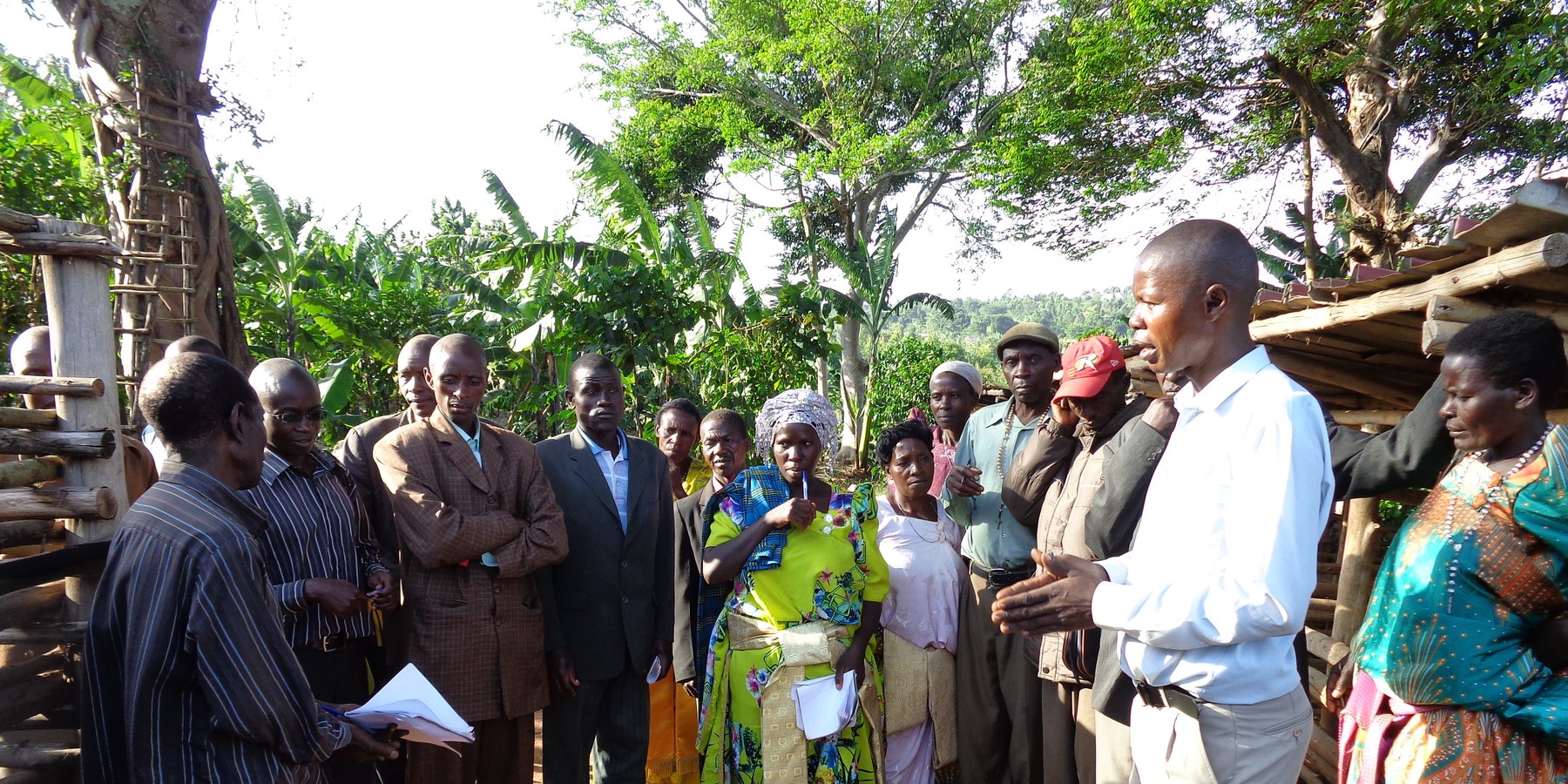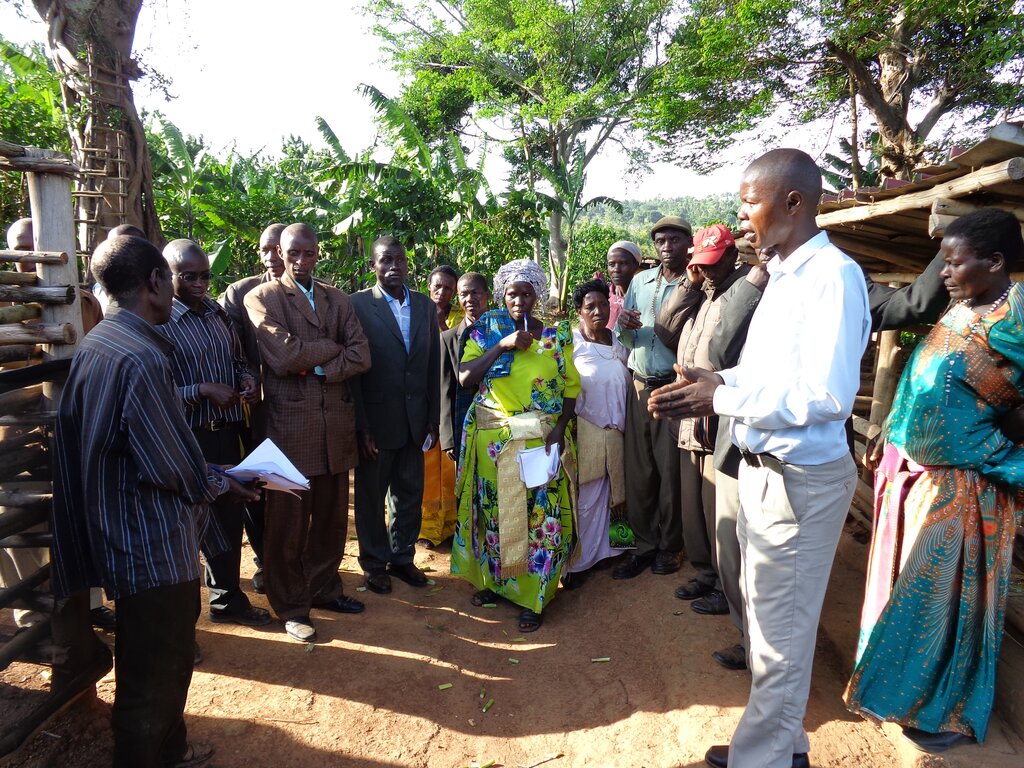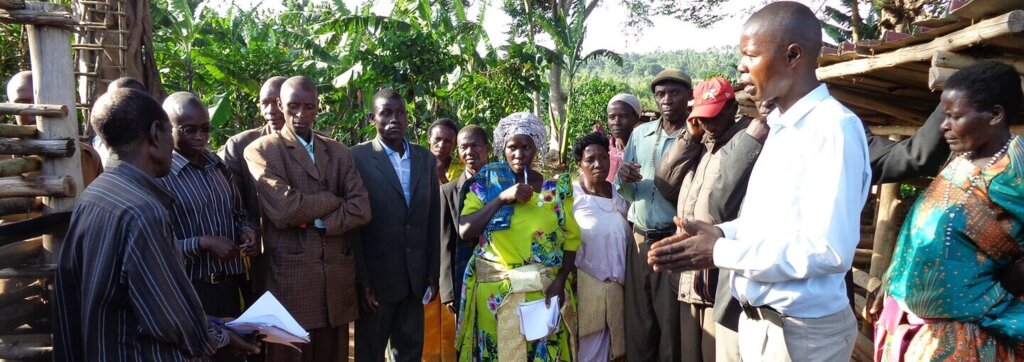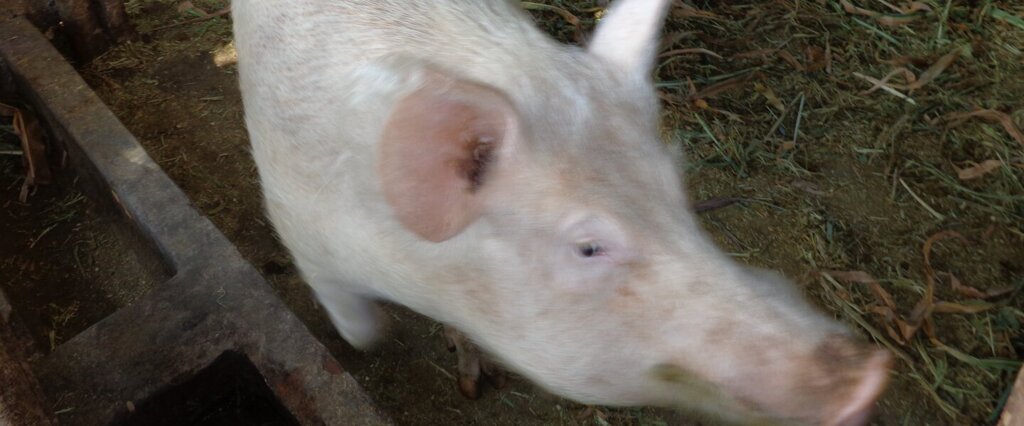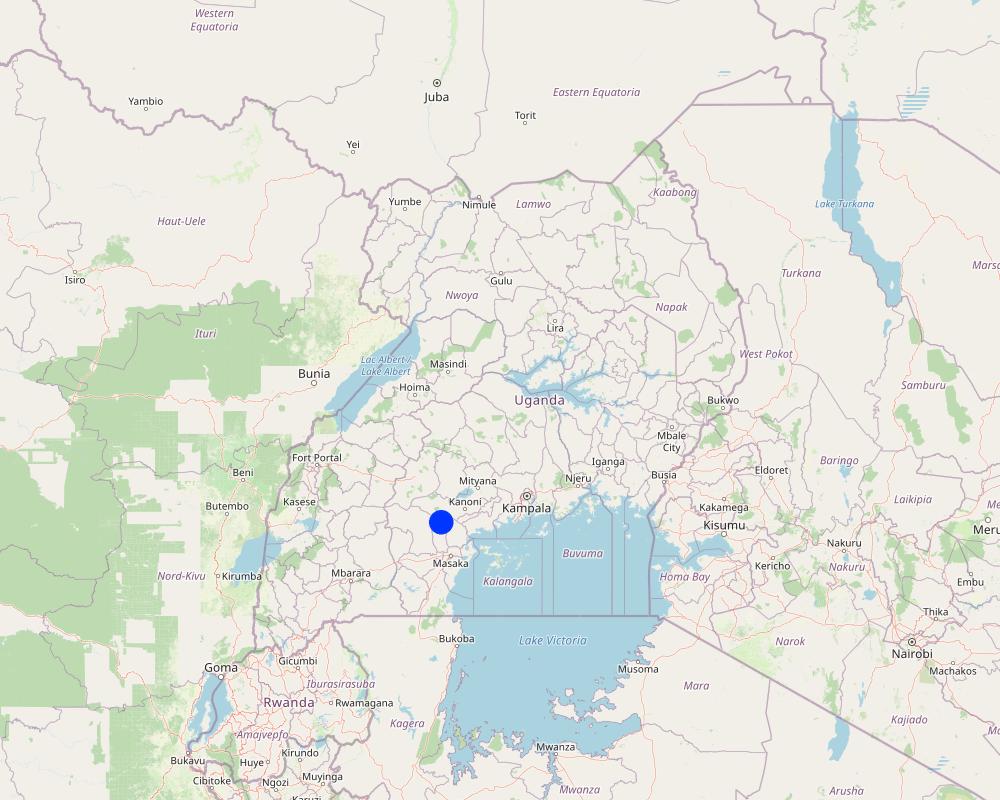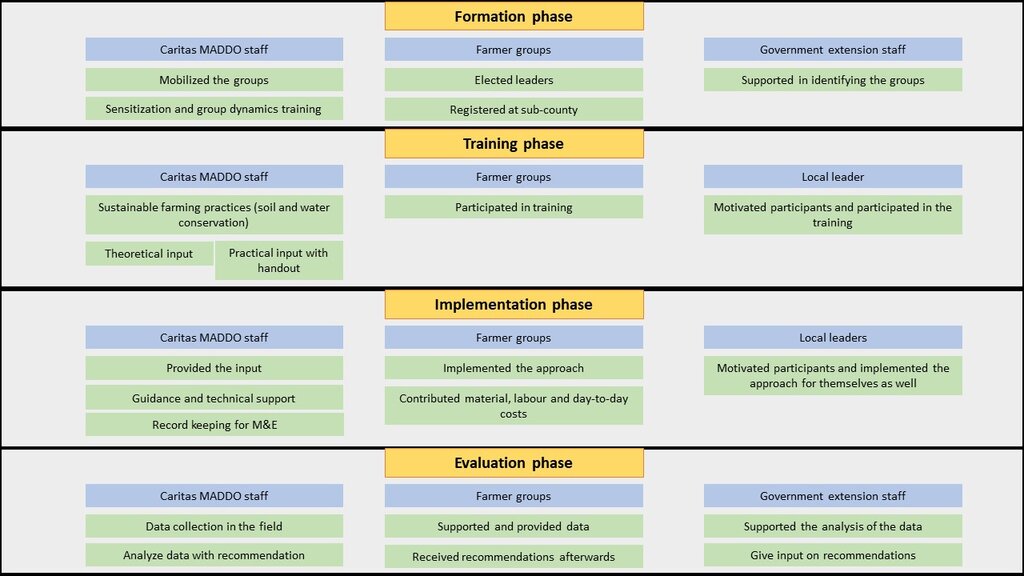MADDO SLM approach [اوغندا]
- تاريخ الإنشاء:
- تحديث:
- جامع المعلومات: Tonny Kyambadde
- المحررون: Beatrice Nabukenya, Michael Mulindwa, Kyagaba Prossy, Annika Reimann
- المراجعون: William Critchley, Rima Mekdaschi Studer
obugimu bwettaka ngokozesa obusa bwembizzi mu mwannyi ne bitooke
approaches_6370 - اوغندا
عرض الأقسام
توسيع الكل طي الكل1. معلومات عامة
1.2 تفاصيل الاتصال بالأشخاص الرئيسيين لمصدر المعلومات والمؤسسات المعنية بتقييم وتوثيق النهج
اسم المشروع الذي سهّل توثيق/تقييم النهج (إذا كان ذلك على صلة)
Euregio-East Africa Livelihood Improvement Programme (EEALIP)اسم المؤسسة (المؤسسات) التي سهلت توثيق/تقييم النهج (إذا كان ذلك على صلة)
Caritas Masaka Diocesan Development Organisation (Caritas MADDO) - اوغندا1.3 الشروط المتعلقة باستخدام البيانات الموثقة من خلال WOCAT
متى تم تجميع البيانات (ميدانيا)؟:
14/07/2021
يوافق جامع المعلومات والشخص (لاشخاص) الرئيسي لمصدر المعلومات على الشروط المتعلقة باستخدام البيانات الموثقة من خلال WOCAT:
نعم
1.4 المراجع الخاصة باستبيان(استبيانات) تقنيات الإدارة المستدامة للأراضي
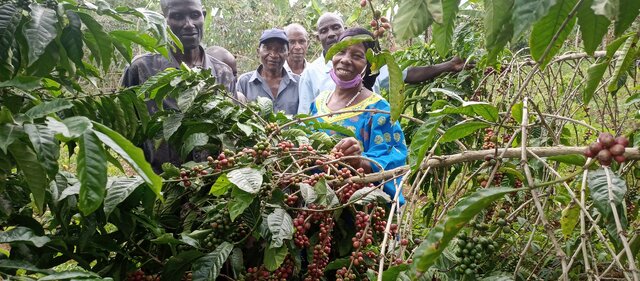
Piggery-Banana-Coffee technology [اوغندا]
The "Piggery-Banana-Coffee" sustainable land management technology is a proven practice that significantly improves soil fertility and productivity in an integrated farming system for smallholder farmers in Uganda.
- جامع المعلومات: Tonny Kyambadde
2. وصف نهج الإدارة المستدامة للأراضي
2.1 وصف موجز للنهج
This integrated soil fertility management approach aims at identifying and promoting practices in land management that can increase soil fertility, reduce land degradation and improve production. Under this specific example, organic manure from a piggery was applied to banana and coffee plantations.
2.2 وصف تفصيلي للنهج
وصف تفصيلي للنهج:
The main objective of the MADDO approach is to test and promote, in a pilot area, the advantages for small-scale farmers of organic manure from piggeries in coffee and banana plantations. The approach aims not only to increase farmers' production through multiple income streams from the integrated production systems but also to secure those income streams by enhancing soil fertility and decreasing land degradation for long-term sustainability. One distinct feature of the approach is the emphasis on cost-effective technologies for small-scale farmers. In the case of the piggery-banana-coffee enterprise, the investment capital needed is very low and the technology is not complicated.
The focus was on small-scale farmer groups of 30-35 members (roughly 200 farmers in 6 groups participated) and was coordinated by Caritas MADDO (one project coordinator and three field staff officers) and agriculture officers from the subcounty level. Groups were identified and implementation concentrated on various trainings for farmers on piggery management, banana and coffee production. In particular, the production of organic manure was highlighted in training, with emphasis on collection, storage and application. After basic training, farmers are led through the one-year production cycle which includes the following stages: rearing of the pigs; manure collection; storage in a pit for decomposition (one to two months); application of the manure during the rainy season when the plants are healthy and actively growing; and then ongoing monitoring, and if needed repetition of the stages and reapplication of the manure (two times per year).
The small-scale farmers appreciate the technology because of the higher production and income they are gaining. It is easy and cheap - particularly because the enterprise can be spread by beneficiary farmers passing on piglets to new farmers. Nevertheless, there is the possibility of the pigs catching diseases (African swine fever) and once infected the farmers have no options for relief as an entire piggery can be wiped out. Moreover, farmers have complained that water scarcity and unsuitable weather conditions can affect production.
2.3 صور عن النهج
2.5 البلد/المنطقة/المواقع التي تم تطبيق النهج فيها
البلد:
اوغندا
المنطقة/الولاية/المحافظة:
Central Region
مزيد من التفاصيل حول الموقع:
Lutugunda village in Bukomansimbi district
Map
×2.6 تواريخ بدء وإنهاء تنفيذ النهج
في حالة عدم معرفة السنة بالتحديد، يرجى الإشارة إلى التاريخ التقريبي لبدء النهج:
منذ أكثر من 50 عامًا (تقليدي)
التعليقات:
The approach is based on the Piggery Banana-Coffee Sustainable Land Management technology that has been practiced for years in the project area. The Euregio project has just promoted the approach and technology recently again.
2.7 نوع النهج
- مبادرة محلية حديثة/مبتكرة
2.8 الغايات/الأهداف الرئيسية للنهج
The main objective of the approach from an organizational perspective was to test in a pilot area the advantages of organic manure from piggery in a coffee and banana plantation. The approach aims not only to increase farmers' production through multiple income streams from piggery, banana and coffee but also to secure those income streams by enhancing the soil fertility and decreasing land degradation for long-term sustainability.
2.9 الظروف التي تمكن أو تعيق تنفيذ التقنية/التقنيات المطبقة بموجب النهج
المعايير والقيم الاجتماعية /الثقافية/ الدينية
- تمكين/تمكيني
Piggeries are common among the groups
توفر/الوصول إلى الموارد والخدمات المالية
- تمكين/تمكيني
Input supply was provided
الإطار المؤسساتي
- تمكين/تمكيني
With the presence of the extension officers from the government and other NGOs in the area
التعاون/التنسيق بين الجهات الفاعلة
- تمكين/تمكيني
Collaboration was part of the overall project design
الإطار القانوني (حيازة الأراضي، وحقوق استخدام الأراضي والمياه)
- تمكين/تمكيني
only customary rights practices, but no conflicts
السياسات
- تمكين/تمكيني
حوكمة الأراضي (صنع القرار والتنفيذ والإنفاذ)
- تمكين/تمكيني
المعرفة حول الإدارة المستدامة للأراضي، والوصول إلى الدعم الفني
- تمكين/تمكيني
الأسواق (لشراء المدخلات وبيع المنتجات) والأسعار
- تمكين/تمكيني
In particular piggery has a high market in the area
عبء العمل، توفر القوى العاملة
- تمكين/تمكيني
3. المشاركة وأدوار الأطراف المعنية
3.1 أصحاب المصلحة المعنيون بالنهج وأدوارهم
- مستخدمو الأراضي المحليون/المجتمعات المحلية
Stakeholders centered around the small-scale farmers (one group of 30-35 members)
- المنظمات المجتمعية
Caritas MADDO
- متخصصون في الإدارة المستدامة للأراضي / مستشارون زراعيون
Agriculture extension officers from subcounty
- منظمة غير حكومية
Caritas MADDO
- الحكومة المحلية
3.2 انخراط مستخدمي الأراضي المحليين/المجتمعات المحلية في المراحل المختلفة للنهج
| انخراط مستخدمي الأراضي المحليين/المجتمعات المحلية | حدد من شارك وصف الأنشطة | |
|---|---|---|
| المبادرة/التحفيز | تفاعلي | The project team involved the community leaders and farmers from prior project phases as well as governmental extension officers have been involved in the initiation of the approach. Activities encompasses the joint group formation and mobilization of fellow farmers to discuss the training needs and capacities. |
| التخطيط | تفاعلي | The above people then continued with jointly discuss the modus operantes with creating a training schedule and actively participating in the learning journey. |
| التنفيذ | التعبئة الذاتية | The implementation mainly encompasses the adoption of the SLM technology, and the farmers were the main implementors and actors with offering pilot land and labor. The project contributed advisory support, monitoring and financial support. |
| الرصد/التقييم | تفاعلي | M&E was done by the project staff, extension officers and the farmers together with the community leaders themselves on a regular basis. |
3.3 مخطط التدفق (إذا كان متاحًا)
3.4 اتخاذ القرار بشأن اختيار تقنية/تقنيات الإدارة المستدامة للأراضي
حدد من الذي قرر اختيار التقنية/التقنيات التي سيتم تنفيذها:
- مستخدمو الأراضي بشكل أساسي، بدعم من متخصصي الإدارة المستدامة للأراضي
اشرح:
Mainly land users, supported by implementing organization
حدد على أي أساس تم اتخاذ القرارات:
- خبرة وآراء شخصية(غير موثقة)
4. الدعم الفني وبناء القدرات وإدارة المعرفة
4.1 بناء القدرات/التدريب
هل تم تقديم التدريب لمستخدمي الأراضي / الأطراف المعنيين الآخرين؟:
نعم
حدد من تم تدريبه:
- مستخدمو الأراضي
- موظفون ميدانيون/ مستشارون
شكل التدريب:
- في العمل
- من مزارع إلى مزارع
المواضيع المغطاة:
Land and soil management
Sustainable agricultural practices
Piggery management
4.2 خدمة استشارية
هل يملك مستخدمو الأراضي وصولا إلى خدمة استشارية؟:
نعم
حدد ما إذا كانت الخدمة الاستشارية متوفرة:
- في حقول مستخدمي الأراضي
4.3 تعزيز المؤسسات (التطوير التنظيمي)
هل تم إنشاء أو تعزيز مؤسسات من خلال هذا النهج؟:
- نعم، قليلا
حدد المستوى (المستويات) التي تم فيها تعزيز أو إنشاء المؤسسات:
- محلي
حدد نوع الدعم:
- بناء القدرات/التدريب
اعط مزيدا من التفاصيل:
Input support
4.4 الرصد والتقييم
هل يشكل الرصد والتقييم جزءا من النهج؟:
نعم
إذا كانت الإجابة بنعم، فهل من المقصود استخدام هذه الوثائق للمراقبة والتقييم؟:
نعم
4.5 البحوث
هل كانت البحوث جزءًا من النهج؟:
نعم
حدد المواضيع:
- علم الايكولوجيا
أعط تفاصيل إضافية وأشر إلى من قام بالبحوث:
Project staff was during minor research on soil improvement and in particular on fitting livestock integrations. Due to this research pigs were chosen as preferred livestock.
5. التمويل والدعم المادي الخارجي
5.1 الميزانية السنوية لمكون الإدارة المستدامة للأراضي في النهج المذكور
أشر إلى ميزانية النهج السنوية لمكون الإدارة المستدامة للأراضي بالدولار الأمريكي:
50000,00
إذا لم تكن الميزانية السنوية الدقيقة معروفة، قم بالإشارة إلى نطاقها:
- 100,000-10,000
التعليقات (على سبيل المثال المصادر الرئيسية للتمويل/الجهات المانحة الرئيسية):
The budget includes staff salary, transport, training costs and inputs for the farmers. In total the approach reached around 200 farmers within six groups in Bukomansimbi (30-35 participants each).
5.2 الدعم المالي/المادي المقدم لمستخدمي الأراضي
هل حصل مستخدمو الأراضي على دعم مالي/ مادي لتنفيذ التقنية/ التقنيات؟:
نعم
إذا كانت الإجابة بنعم، حدد نوع (أنواع) الدعم والشروط والمزودين:
Land users were given input support (coffee seedlings, banana suckers, pigs)
5.3 إعانات لمدخلات محددة (بما في ذلك العمالة)
- غير موجود
- زراعة
| حدد المدخلات التي تم دعمها | إلى أي مدى | حدد الإعانات |
|---|
إذا كان العمل من قبل مستخدمي الأراضي مدخلاً جوهريًا، فهل كان:
- تطوعي
5.4 الائتمان
هل تم توفير ائتمان في إطار نهج أنشطة الإدارة المستدامة للأراضي؟:
كلا
5.5 حوافز أو وسائل أخرى
هل تم استخدام حوافز أو أدوات أخرى لتشجيع تنفيذ تقنيات الإدارة المستدامة للأراضي؟:
كلا
6. تحليل الأثر والتصريحات الختامية
6.1 آثار النهج
هل ساهم النهج في تمكين مستخدمي الأراضي المحليين وتحسين مشاركة الأطراف المعنية؟:
- لا
- نعم، قليلا
- نعم، باعتدال
- نعم، إلى حد كبير
Technical knowledge of improved management was testified by local land users and group cohesion was strengthened through community labor pooling.
The piloting of the approach lead to evidence decision-making in the form that farmers know about the advantage of the organic manure in increasing soil fertility and increased production.
Agriculture extension officer
In particular women were part of the test group (80 %)
7 farmers were youth (under 30 years) in the group
Training on hygiene of the piggery was given. Moreover, farmers mobilized for underground water tanks (positive side effect of the approach)
Prevents soil degradation
6.2 المحفز الرئيسي لقيام مستخدمي الأراضي بتنفيذ الإدارة المستدامة للأراضي
- زيادة الإنتاج
A pulling factor was the fast economic benefit and food security for the participants.
- زيادة الربح (القدرة)، وتحسين نسبة التكلفة إلى العائد
Income was increased through the multiple income streams.
- المدفوعات/ الإعانات
The Euregio project was contributing inputs required for the technology.
- تعزيز المعرفة والمهارات في مجال الإدارة المستدامة للأراضي
Curiosity and eagerness to learn about the approach and technology.
6.3 استدامة أنشطة النهج
هل يمكن لمستخدمي الأراضي المحافظة على استدامة ما تم تنفيذه من خلال النهج (بدون دعم خارجي)؟:
- نعم
إذا كانت الإجابة بنعم، صف كيف:
With the pass on mechanisms of the pigs and the capacity building through the extension officers. The pass on mechanisms works similar to the Heifer pass on, where participating farmers have to contribute their newborn piglets to other members within the group that have not benefited from the prior project input.
6.4 نقاط قوة/مزايا النهج
| نقاط القوة/ المزايا/ الفرص من وجهة نظر مستخدمي الأراضي |
|---|
| The pilot small-scale farmers appreciate the approach because of the higher production and income there are gaining. The approach is easy and cheap to be implemented and in particular because a pass-on mechanisms of the pigs were applied. |
| نقاط القوة/ المزايا/ الفرص من وجهة نظر جامع المعلومات أو غيره من الاشخاص الرئيسيين لمصدر المعلومات |
|---|
| Advantages was in the participatory approach, and it was an interactive learning experience |
6.5 نقاط الضعف/ العيوب في المنهج وطرق التغلب عليها
| نقاط الضعف/ المساوىء/ المخاطر من وجهة نظر مستخدم الأراضي | كيف يمكن التغلب عليها؟ |
|---|---|
| The approach is unfortunately affected by the possibility of the pigs catching diseases (African swine fever) and once infected the farmers have no options for relief as entire piggery will be wiped out. | Hygiene training was given and practiced |
| Moreover, farmers have complained that water scarcity and unsuitable weather conditions have affected the approach. | Farmers mobilized for underground water tanks |
| نقاط الضعف/ المساوىء/ المخاطر من وجهة نظر جامع المعلومات أو غيره من الاشخاص الرئيسيين لمصدر المعلومات | كيف يمكن التغلب عليها؟ |
|---|---|
| For the compilers it was difficult to access some of the Information from farmers (e.g., basic records on feeding or construction) | Training was given and also information was collected together with farmers (e.g. calculation made together on construction costs) |
7. المراجع والروابط
7.1 طرق جمع/مصادر المعلومات
- زيارات ميدانية، مسوحات ميدانية
Roughly 20 field visits have been conducted (without trainings) to the participating groups.
- مقابلات مع مستخدمي الأراضي
Interviews have been done on group level and individually. Mainly the participating farmers, community leaders and extension officers have been interviewed by the project staff to gain data and to validate information.
- التجميع من التقارير والوثائق الأخرى الموجودة
Sustainable Agricultural Practice trainings and manual (from Caritas MADDO) and literature used for the technology
7.2 المراجع للمنشورات المتاحة
العنوان، المؤلف، السنة، النظام القياسي الدولي لترقيم الكتب ISBN:
Not used
7.3 روابط للمعلومات ذات الصلة المتوفرة على الإنترنت
العنوان/الوصف:
Not used
الروابط والوحدات المواضيعية
توسيع الكل طي الكلالروابط

Piggery-Banana-Coffee technology [اوغندا]
The "Piggery-Banana-Coffee" sustainable land management technology is a proven practice that significantly improves soil fertility and productivity in an integrated farming system for smallholder farmers in Uganda.
- جامع المعلومات: Tonny Kyambadde
الوحدات المواضيعية
لا يوجد وحدات مواضيعية


